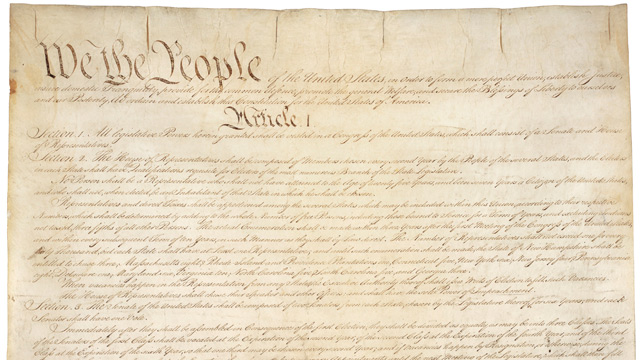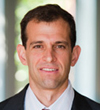BillMoyers.com is proud to collaborate with EveryVoice on a series of op-eds featuring ideas from a variety of viewpoints for making our democracy one that is truly of, by and for the people. Discover more ways to fight back against our broken campaign finance system. It’s a fight we can win.

Photo: US National Archives and Records Administration/ Wikimedia Commons

Our Constitution begins with the powerful words “We the People” and elaborates a political system in which the people are sovereign. Yet in a series of decisions, of which Citizens United v. Federal Election Commission is the most notorious, the US Supreme Court has interpreted the First Amendment of that document so as to erode our democracy. Now it’s time to amend the great document to re-establish democratic principles.
Americans widely perceive – correctly – that the political system is rigged. But even so, few realize how small in number are those doing the rigging. Occupy Wall Street focused attention on the one percent; but just the top point-oh-one-percent (.01 percent) are responsible for more than 40 percent of all political contributions. Fewer than 200 individuals and their spouses are responsible for almost 60 percent of the more than $1 billion in super PAC spending since 2010, according to a Brennan Center analysis. We’ll never know which robber barons and giant corporations are fueling the surge in dark money, but it’s almost surely at least as tight a group as the super PAC funders.
Not surprisingly, a politics funded by this tiny class of the super rich and corporations is responsive to their own interests and not to those of the American people. And there is a big difference.
The super rich are not like you and me. More than half of the top one percent “favor cuts in Medicare, education and highways to reduce budget deficits;” only about a quarter of the rest of the population agree. Eighty-seven percent of the general population agree that “government should spend what is necessary to ensure all children have good public schools;” only 35 percent of the super rich share that sentiment. And while 53 percent of regular people believe that “government should provide jobs to everyone who can’t find one in the private sector,” only eight percent of the super rich agree.
By overwhelming margins, Americans favor raising the minimum wage, reducing wealth and income inequality, stopping any more NAFTA-style trade agreements, breaking up giant banks, investing in infrastructure, taking measures to avert catastrophic climate change, and protecting and expanding Social Security and Medicare. But these strong policy preferences clash with the interests of the corporate class, and the corporate class prevails – thanks in very substantial part to Big Money’s dominance of our politics.
Ending Big Money’s dominance – choosing democracy over oligarchy – will require a wide range of solutions. As a first and immediate measure, we need robust disclosure to end the phenomenon of dark money. For local, state and federal elections, we need to replace the super rich-dominated campaign finance system with one that empowers regular people to make a difference with small contributions, backed up by robust public matching funds.
Yet ultimately, reclaiming our democracy will require a constitutional amendment. As a matter of basic democratic principle, we need to make clear that We the People have the authority to set the rules for election spending as we see fit. We must overturn the Supreme Court-created doctrines that “money is speech” (meaning that election contributions and spending are entitled to the same kinds of robust First Amendment protections as actual speech) and “corporations are people” (meaning that corporations are entitled to the same constitutional protections as living, breathing human beings).
We need the amendment (or a Supreme Court reversal of its campaign finance jurisprudence) as a practical matter, as well. With current Supreme Court jurisprudence in place, we can empower small donors and enable public financing of elections, but we can only impose limited restraints on super-rich contributions to candidates (and even those limits are in jeopardy). Most important, for as long as we live in the Citizens United era, we can’t impose limits on outside spending by the super rich and giant corporations.
That outside spending has in many ways become the defining feature of our election landscape. Outside groups, such as the US Chamber of Commerce and those controlled by the Koch Brothers and Karl Rove, are spending vast sums. They concentrate their money on close races, where their spending often exceeds that of the candidates themselves. Outside groups focus on negative attack ads, which work, and for which they cannot be held accountable (unlike candidates).
In many races, it is the outside groups that are defining the contours of the campaign. There is no limit on outside spending, nor any limits on what individuals or corporations can contribute to outside spending efforts, so this is the arena that by definition most elevates the corporate class. If you have any doubt about the decisive importance of this spending, consider this: The Koch Brothers have announced plans to spend, through their network, $889 million on the 2016 elections. That’s more than any political party heretofore.
Winning a constitutional amendment is, by design, incredibly difficult. But that’s no reason to shrink from the project. It’s right on the merits, and we need it as a practical solution. The idea of a constitutional amendment is also hugely energizing and mobilizing, in a way distinct from other reform measures. People get that the system is rigged, they get that corporations have far too much power, they understand that Big Money is corrupting our democracy in fundamental ways, they passionately believe that super rich ownership of our elections is incompatible with core notions of political equality. People understand how big the problem is, and they want big solutions.
Since Citizens United was handed down five years ago, a powerful movement has risen up across the country. Sixteen states have already passed resolutions or similar measures calling for an amendment, as have nearly 600 cities and towns. More than five million people have signed petitions. Polling shows overwhelming support for an amendment, including strong majority support among Republicans. People turn out on the street for the amendment – last April, there were more than 150 demonstrations nationwide on the day the Supreme Court issued its decision in McCutcheon v. FEC, another ruling designed to enable the super-rich to spend more.
Even if the movement for an amendment does not prevail, the energy around the effort is helping carry forward advocacy around disclosure, small donor financing and other election reform measures. This demonstrated and sustained grassroots demand for an amendment is the best means to nudge the Supreme Court – when someday its composition has changed – to overturn Citizens United and other harmful campaign spending decisions.
But this is not a movement organized around symbolic politics. The effort to win an amendment is gaining ground faster than anyone could have anticipated. In 2010, four US senators supported an amendment. In 2012, the number grew to 26. In 2014, following the McCutcheon decision, Senate leadership brought the Democracy for All constitutional amendment – establishing that We the People, operating through Congress and the state legislatures, have the authority to regulate campaign spending – to the floor for a vote. Fifty-four senators voted in favor. Not yet enough to prevail – winning a constitutional amendment requires a two thirds vote in each house, followed by ratification in three quarters of the states — but a showing of support that even a year previous was unimaginable.
We know exactly why the amendment came to the floor and why it won so many votes: Senators were responding to the demand from the grassroots. As the movement continues to gain power and support – as we quiet the skeptics and chip away at the established Republican Party opposition to reform – we’ll take the next step forward. The day is not long off when we win the 28th Amendment to the US Constitution.


